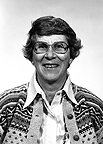April 01, 2008
Colleagues remember Betty Fladeland as a pioneer
CARBONDALE, Ill. — She fought the good fight, using historical research and well-reasoned arguments as her weapons.
Betty Fladeland, distinguished professor of history at Southern Illinois University Carbondale and an important figure in the history of the Abolitionist Movement, died at her Carbondale home last month. She was 89.
Fladeland is remembered among the scholarly community as the author of articles and three books about the anti-slavery movement. The books, "James Birney: Slaveholder to Abolitionist" (1955), "Men and Brothers: Anglo-American Anti-Slavery Cooperation" (1972) and "Abolitionist and Working Class Problems in the Age of Industrialization" (1984), continue to appear in current bibliographies.
Fladeland was instrumental in establishing the Black American Studies program at SIUC in 1968 and taught some of the very first courses offered in that program of study.
Fladeland also researched and published in women's history, including articles in the journal "Michigan History" about Sarah Emma Edmonds who, disguising herself as a man, served with the Michigan Volunteer Infantry Regiment during the Civil War.
Fladeland was one of the first presidents of the Society for Historians of the Early American Republic. She was elected in 1984 and served for a year. In 1983, the Friends of Morris Library at SIUC named her a Delta Award Winner for "contributing to an understanding of the battle against slavery." The Organization of American Historians also recognized her as a distinguished member.
Michael Batinski, chair of the Department of History at SIUC, said Fladeland was a senior colleague when he joined the faculty in 1968. He described her as a "remarkable historian."
"Her work on the Abolitionist movement, first in the United States and later in Great Britain, won her a reputation on both sides of the Atlantic," he said. "She was a pioneer in creating the now-established scholarly community on trans-Atlantic Abolition… (and her work) remains well regarded by younger historians."
Joseph Brown, director of the Black American Studies program at SIUC, said he found himself "humbled by her wit, her professionalism and her prophetic presence in this community" when he met Fladeland.
Batinski, too, noted Fladeland's presence and professionalism, saying that not all of her achievements can be "registered in a curriculum vitae." He noted that Fladeland had to contend with prejudice at every turn, first when she taught the first SIUC course on the history of American women and then again she when she taught the first course on Black American history.
"As I worked with Betty, I realized that her presence in this University during the 1960s and 1970s was especially significant for young women who looked to her as a model when there were too few people like her on this campus. I think I can speak for those students when I propose that this was one of her lasting legacies."
Batinski concluded his reminiscence by saying he did not always agree with Betty Fladeland, and remembers arguments about politics and historiography.
"And, during the arguments, I learned much from her about the meaning of this profession," he said. "She became a good friend."
Fladeland was a native of Minnesota, graduating from Duluth State College in 1940 and earning a master's degree from the University of Minnesota. She earned her doctoral degree from the University of Michigan in 1952. Her teaching experience included Wells College in New York, Central Michigan University and Central Missouri State College. She joined the faculty at SIUC in 1962, where she was recognized as a Distinguished Service Professor.

